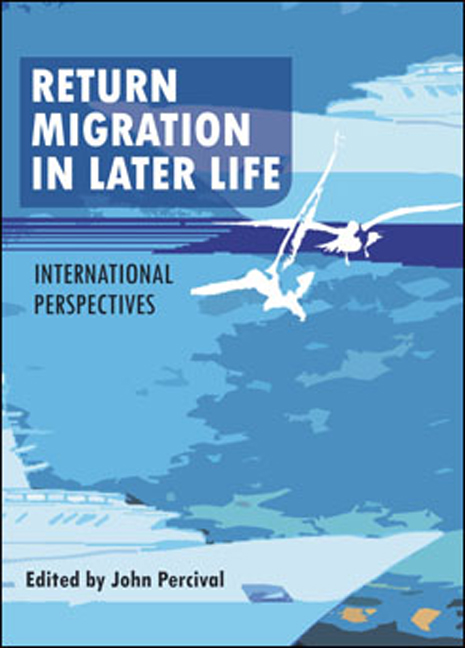Book contents
- Frontmatter
- Contents
- List of tables and figures
- Notes on contributors
- Acknowledgements
- one Charting the waters: return migration in later life
- two Older immigrants leaving Sweden
- three Place and residence attachments in Canada’s older population
- four Ageing immigrants and the question of return: new answers to an old dilemma?
- five Caribbean return migration in later life: family issues and transnational experiences as influential pre-retirement factors
- six ‘We belong to the land’: British immigrants in Australia contemplating or realising their return ‘home’ in later life
- seven Diasporic returns to the city: Anglo-Indian and Jewish visits to Calcutta in later life
- eight Returning to ‘roots’: Estonian-Australian child migrants visiting the homeland
- nine Ageing in the ancestral homeland: ethno-biographical reflections on return migration in later life
- ten ‘The past is a foreign country’: vulnerability to mental illness among return migrants
- eleven The blues of the ageing retornados: narratives on the return to Chile
- twelve Concluding reflections
- Endnotes
- Index
four - Ageing immigrants and the question of return: new answers to an old dilemma?
Published online by Cambridge University Press: 01 February 2022
- Frontmatter
- Contents
- List of tables and figures
- Notes on contributors
- Acknowledgements
- one Charting the waters: return migration in later life
- two Older immigrants leaving Sweden
- three Place and residence attachments in Canada’s older population
- four Ageing immigrants and the question of return: new answers to an old dilemma?
- five Caribbean return migration in later life: family issues and transnational experiences as influential pre-retirement factors
- six ‘We belong to the land’: British immigrants in Australia contemplating or realising their return ‘home’ in later life
- seven Diasporic returns to the city: Anglo-Indian and Jewish visits to Calcutta in later life
- eight Returning to ‘roots’: Estonian-Australian child migrants visiting the homeland
- nine Ageing in the ancestral homeland: ethno-biographical reflections on return migration in later life
- ten ‘The past is a foreign country’: vulnerability to mental illness among return migrants
- eleven The blues of the ageing retornados: narratives on the return to Chile
- twelve Concluding reflections
- Endnotes
- Index
Summary
Introduction
This chapter explores dilemmas that immigrants from Italy and Spain may face, when nearing retirement in Switzerland and considering their future country of residence. In particular, the chapter examines these dilemmas from two complementary theoretical perspectives: institutional and transnational. I will briefly discuss these perspectives before accounting for the methods employed in two particular studies, the themes and criteria arising from them, and implications for different models of return.
Institutional perspective and the question of return
The works of Sayad (1991, 1999) in France and of Dietzel-Papakyriakou (1993, 2001) in Germany are representative of the institutional perspective. According to this perspective, structure, and especially States’ modes of organisation and immigration policies, is more important than agency in immigrants’ lives. Sayad argues, following Hanna Arendt (1981), that in a world politically organised in nation-states international migration is an exception, an anomaly that should be justified. In a world governed by the logic of economics, the main justification for migration is work, but not all kinds of work. Migrants must prove that their presence in the host society is useful for the economy of the host country. They must also attest that they are not in competition with nationals for the same kinds of jobs.
From the moment that immigrants find themselves in a situation of ‘vacancy’ (unemployment, disability, illness, accident, welfare dependency and also retirement), that is, when they cease to be workers and to have a positive economic role, the legitimacy of their presence in the host society can be questioned and their lack of utility seen as problematic. According to Dietzel-Papakyriakou: ‘For the society of residence, with retirement the structural legitimation of extension of stay of older migrants who left the labour market is a problem: they become mere cost factors. Social acceptance is crumbling. The extension of their stay violates the agreement that led to their recruitment, which was based exclusively on employment’ (1993:145, author's translation). Even when they are integrated in the labour market, their presence is considered as provisory. The designation of older immigrants as Gastrentners (guest pensioners) is also an indicator that they are not completely considered as a settled and accepted element of the national population.
Information
- Type
- Chapter
- Information
- Return Migration in Later LifeInternational Perspectives, pp. 67 - 88Publisher: Bristol University PressPrint publication year: 2013
Accessibility standard: Unknown
Why this information is here
This section outlines the accessibility features of this content - including support for screen readers, full keyboard navigation and high-contrast display options. This may not be relevant for you.Accessibility Information
- 1
- Cited by
